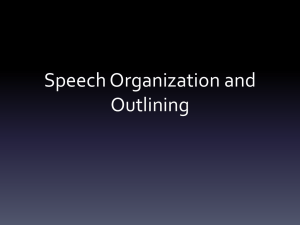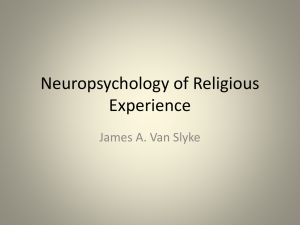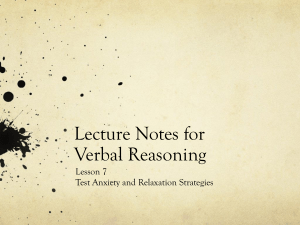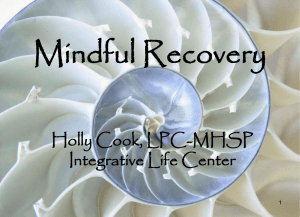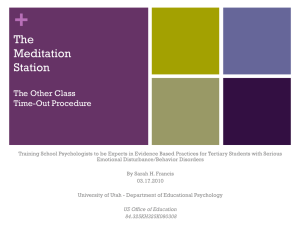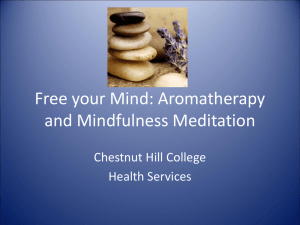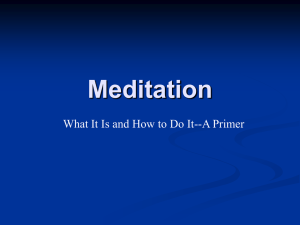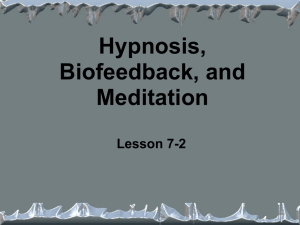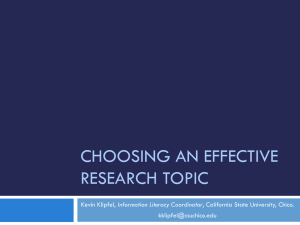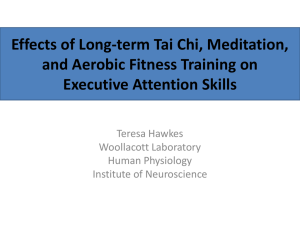Chapter 8, meditation
advertisement
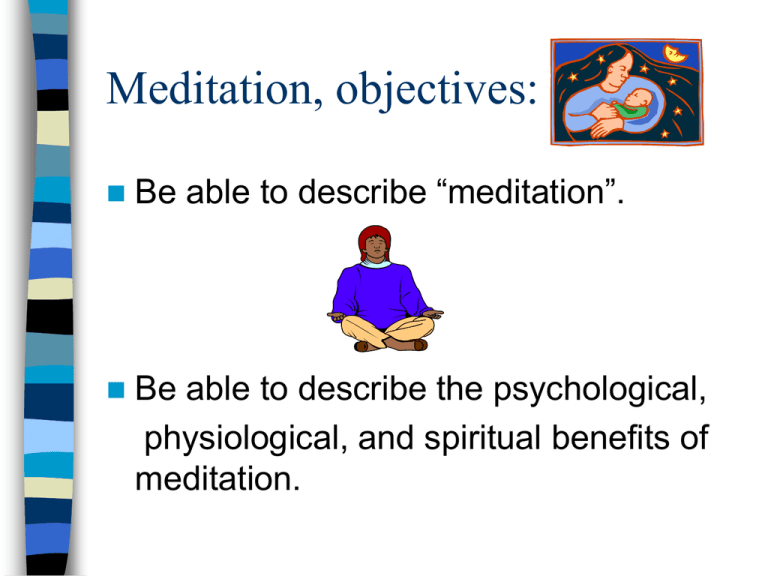
Meditation, objectives: Be able to describe “meditation”. Be able to describe the psychological, physiological, and spiritual benefits of meditation. Meditation: Is a tool for developing the mind. Can create a greater calm. Can help bring insight into your experience of the moment. From insight comes greater freedom to live more wisely and happily. Why Meditate?: Much of the time we run around so much on “automatic pilot”, we have chattering going on, and we are so busy, we hardly know what we are doing. To become familiar with the workings of your mind-body- and spirit. It lengthens the gap between your thoughts, therefore decreasing the “chatter”. Meditation: Teaches you to make decisions that will bring you in touch with the way things work in this world or “natural laws of the universe”. Trains people to watch their thought processes as a flow, and to step back from them and observe, to be mindful, and to watch what is going on in the mind. Gradually this mindfulness practice will spill over into the rest of your life. Meditation: Can help you deal with old problems in new ways. Can help you not get hooked into the “I” onto feelings or situations you are in, and therefore do not become judgmental.( do not take things so personally) Can result into a peacefulness that strengthens the mind by freeing turmoil. Spiritual effects of meditation: Meditation is “listening to yourself” and praying is “talking to God”. When listening to yourself, you connect with the “real you”. Psychological effects of meditation: It gives you the feeling of being “Centered”. Feel less anxiety. You learn how to focus on one thing at a time with softness and mindfulness. It keeps you in the “now” or present moment. Physiological effects of meditation: Metabolic rate drops, i.e. heart rate, respirations, blood pressure, and oxygen consumption decrease. Immune system function improves. Biological aging is slowed. You have greater physical energy and stamina. How to meditate, may need to do a relaxation exercise: TSMS Tense muscles, Shake, Move, then Stretch Find a quiet environment, take the phone off the hook, may need to set an alarm, start with 5-10 minutes, work up to 20-30 minutes. Sit (or lay down) in a comfortable position, palms open. Continued: Spine straight. Feet flat on the floor. Or lotus position Hands on legs, relaxed. Pretend that you have a string attached to your head and it is being pulled up. How to meditate continued: The key is focusing on your breath. Where do you notice it the most? Pick the point that you are drawn to and focus on that area. This quiets the mind and allows you to feel and experience what is going on inside of you. The mind is kept busy watching the breath and therefore has no chance to overcome you with anxieties. During meditation, check in: From head to toe. Any tension, pain, or discomfort? Note the sensations, observe, try not make judgments, get irritated, frustrated or give up. Acknowledge any unpleasant sensations 3 times without judgment, and check in again. Allow each area of your body to relax. Handling difficulties in meditation: When a sensation becomes so strong as to distract you, turn your attention to it, and observe, then, return focus to breathing. Sluggishness or sleepiness occurs due to lack of stimulation, focus more intently on your breath. Restlessness may occur, acknowledge it and return focus to breath. It you begin having distracting thoughts, gently bring your focus back to your breath. Handling difficulties, continued: If someone begins occupying your thoughts, and you become irritated try to be compassionate and forgive. Each time you bring your thoughts to your breath or to the “gap” you strengthen your “meditation muscle”. Like any program of exercise, the more you do it, the stronger you become. It takes time and effort. Meditation: Helps to access deep inner resources for healing. Calming the mind so you can be more effective. Helps you make sensible choices under pressure. Helps cope with stress. Helps you to feel better about your body Helps you be more engaged in life. Meditation: Helps you be a “human being” instead of a “human doing”. Can enrich your relationships with people. Helps to integrate and align the mind-bodyspirit. Can help you find shelter from the “wind” that agitates the mind. The “winds” of life are always blowing. “You can’t stop the waves (or winds) but you can learn to surf.” Jon Kabat-Zinn Meditation: Is synonymous with non-doing. We are not practicing to make things perfect or to do things perfectly. Rather we practice to grasp and realize that things are already perfect. This has everything to do with holding the present moment in its fullness without imposing anything extra on it. It is the opposite of “multitasking”. Meditation: Helps to allow more things to unfold without forcing them to happen, and without rejecting the one’s that don’t fit your idea of what should be happening. Helps us to understand that everything happens for a reason, there are no accidents (coincidences). Helps you practice patience, just like the seasons cannot be hurried, they change on a natural rhythm. Meditation notes, continued: Scratch the surface of impatience and you will find anger. Impatience and anger can be related to “not wanting things to be the way they are” and often blaming someone or something or your self. This doesn’t mean you can’t hurry when you have to, but do it mindfully and with choice. Meditation notes continued: When we have to push, we push, when we have to pull, we pull. But with deeper awareness that comes with meditation, we know when not to pull or push. There can be no tug-of-war, when one person lets go. “Do you have the patience to wait until the mud settles and the water is clear? Can you remain unmoving till the right action arises by itself ?” Lao-Tzu, Tao-Te-Ching In summary: Meditation helps us to become more mindful. Mindfulness helps us to focus on one thing at a time (it is the opposite of multitasking). Meditation does not try to change our thinking by thinking some more. It involves watching our thoughts, so we are less a prisoner of our thoughts. In summary continued: Thoughts can be narrow and inaccurate and become a prison. Meditation has tremendous psychological and physiological benefits. Meditation can free us.

